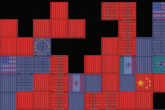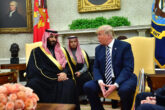January 29, 2018
The Missing Piece in the World’s North Korea Strategy
Last Wednesday, the United States Treasury added to its economic pressure campaign against North Korea, sanctioning a variety of entities the Kim regime uses to evade international, multilateral sanctions. In announcing moves against these targets on January 24, the Treasury Department said that “[t]oday’s sanctions target agents of the Kim regime financing or otherwise supporting North Korea’s WMD programs and other illicit businesses.”
While the administration and its allies in the region have relied on military deterrence and ratcheting up of sanctions, there is a missing component: a concerted international effort to roll back North Korea’s abuse of the global financial system to aid in the procurement of weapons of mass destruction, which those who study the issue call countering proliferation finance (CPF).
These new designations follow a number of high-profile cases underscoring how North Korea evades international sanctions. At the end of 2017, South Korean authorities announced that they had seized a Panamanian-flagged oil tanker suspected of transferring oil to North Korea, in violation of international sanctions designed to deter the country’s further pursuit of nuclear weapons capability. This is the second such seizure since November 2017 and underlines the sophistication of North Korea’s proliferation networks. While many states have engaged in transnational financial criminal behavior — money laundering and sanctions evasion — the threat emanating from North Korea is unique. Its ability to exploit weak spots in the global financial regulatory and nuclear nonproliferation regimes is unparalleled.
Read the full op-ed in The Diplomat.
More from CNAS
-
Game Over?
The trade wargame suggests that sustained high tariffs could create leverage and urgency to spur action toward a productive restructuring of the international trade system....
By Emily Kilcrease & Geoffrey Gertz
-
Middle East Security / Energy, Economics & Security
Trump Inks $600 Bn Deal In Saudi Arabia | Musk, Blackrock CEO Flank Trump In Gulf VisitIn today's episode of India Global, U.S. President Donald Trump secured a $600 billion commitment from Saudi Arabia on Tuesday to invest in the United States. NDTV's Gaurie Dw...
By Daniel Silverberg
-
Energy, Economics & Security / Technology & National Security
Tariffs and Tech: An Uncertain RecipeHigher tariffs could prompt American cloud companies to shift more of their capital investments abroad....
By Pablo Chavez
-
Trump Tariffs: How Will U.S. Plans Reshape the Global Economy?
Donald Trump says he's already decided the tariffs he will impose on countries that export goods to America, including the United Kingdom. Channel 4 hears from Emily Kilcrease...
By Emily Kilcrease




